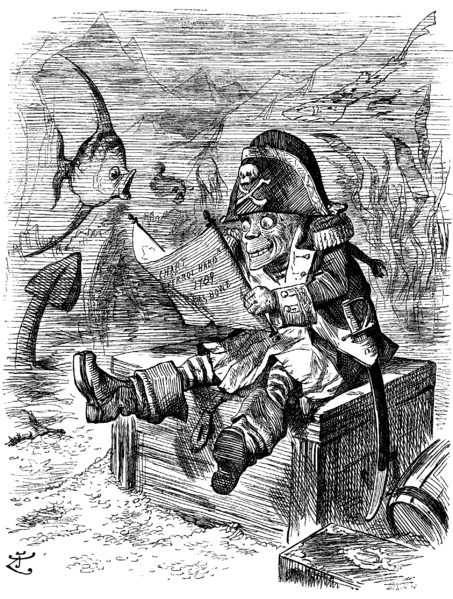In Davy Jones' Locker of course. It's a terrible old Christmas Cracker joke. But having just watched the latest adaptation of Robert Louis Stevenson's Treasure Island (the one with Eddie Izzard, Philip Glenister and Donald Sutherland) I found myself wondering about the origin of the phrase. Upon death, a good sailor - a god-fearing man or who had served honestly for 50 years - would end up in Fiddlers' Green; a place 'nine miles beyond the dwellings of his satanic majesty' where jigs were played all day and the rum and the women never ran out. However, the body of a wicked sailor went instead to Davy Jones's locker to suffer eternal torment and damnation. But who was Davy Jones and why is his locker (an old term for a chest) a synonym for a watery grave?
Sadly, it seems that no one really knows. However, there are several popular theories and I'll list them here:
The first relates to an actual David Jones, who was a pirate on the Indian Ocean in the 1630s. However, most scholars agree that he was not renowned enough to gain such lasting global fame. Then there was a British pub owner called David Jones who supposedly threw drunken sailors into his ale locker and then dumped them onto any passing ship (or gave them up to the naval press gangs). He is mentioned in the 1594 song Jones's Ale is Newe. Or it could be a reference to 'Duffer Jones', a notoriously myopic sailor who often found himself falling overboard.
Others claim that it's the invention of Welsh sailors who would call upon Saint David, also known as Dewi, for protection in times of mortal danger. Davy may also stem from Duppy or Duffy, a West Indian term for a malevolent ghost, or from Jonah, the 'evil angel' of all sailors. Jonah, you'll recall from the Bible, was so cursed with bad luck that his shipmates threw him into the sea where he was swallowed by a whale. Davy Jones may be a corruption of 'Devil Jonah'.
Another suggestion is that it comes from Deva Lokka or Loka, a Hindu goddess of death. Although Deva is undoubtedly a Hindu term for a goddess, it is not clear that there was such a figure as 'Deva Loka' (However, it was used as the name of a planet in the 1982 Doctor Who TV series Kinda).
The first use of the term in print (that we know of) was in 1726 when Daniel Defoe mentions it in his book The Four Years Voyages of Capt. George Roberts: 'Heaving the rest into David Jones's locker, i.e. the sea.'
He then turns up as a malevolent demon or spirit in Tobias Smollett's The Adventures of Peregrine Pickle (1751): 'By the Lord! Jack, you may say what you wool; but I'll be damned if it was not Davy Jones himself. I know him by his saucer eyes, his three rows of teeth, his horns and tail, and the blue smoke that came out of his nostrils. [...] This same Davy Jones, according to the mythology of sailors, is the fiend that presides over all the evil spirits of the deep, and is often seen in various shapes, perching among the rigging on the eve of hurricanes, shipwrecks, and other disasters, to which a seafaring life is exposed; warning the devoted wretch of death and woe.'
Is it just a curious coincidence that, when writing Treasure Island in 1881, Robert Louis Stevenson named the captain of the Hispaniola 'Smollett'?
Then there is this definition in the 1803 Naval Chronicle: '... seamen would have met a watery grave; or, to use a seaman's phrase, gone to Davy Jones's locker.' It may have already been in popular use as a euphemism for a century by then.
Ha-Haar.


No comments:
Post a Comment